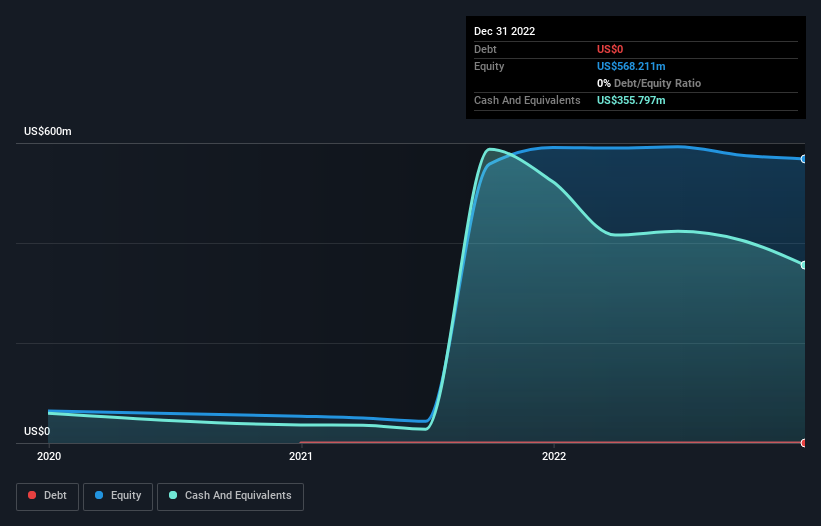[ad_1]
We can readily understand why investors are attracted to unprofitable companies. For example, although software-as-a-service business Salesforce.com lost money for years while it grew recurring revenue, if you held shares since 2005, you’d have done very well indeed. Having said that, unprofitable companies are risky because they could potentially burn through all their cash and become distressed.
So should IonQ (NYSE:IONQ) shareholders be worried about its cash burn? In this article, we define cash burn as its annual (negative) free cash flow, which is the amount of money a company spends each year to fund its growth. Let’s start with an examination of the business’ cash, relative to its cash burn.
Check out our latest analysis for IonQ
When Might IonQ Run Out Of Money?
A company’s cash runway is the amount of time it would take to burn through its cash reserves at its current cash burn rate. When IonQ last reported its balance sheet in December 2022, it had zero debt and cash worth US$356m. Looking at the last year, the company burnt through US$57m. That means it had a cash runway of about 6.2 years as of December 2022. Importantly, though, analysts think that IonQ will reach cashflow breakeven before then. In that case, it may never reach the end of its cash runway. The image below shows how its cash balance has been changing over the last few years.
How Well Is IonQ Growing?
IonQ actually ramped up its cash burn by a whopping 57% in the last year, which shows it is boosting investment in the business. Given that operating revenue was up a stupendous 430% over the last year, there’s a good chance the investment will pay off. Considering the factors above, the company doesn’t fare badly when it comes to assessing how it is changing over time. Clearly, however, the crucial factor is whether the company will grow its business going forward. For that reason, it makes a lot of sense to take a look at our analyst forecasts for the company.
Can IonQ Raise More Cash Easily?
There’s no doubt IonQ seems to be in a fairly good position, when it comes to managing its cash burn, but even if it’s only hypothetical, it’s always worth asking how easily it could raise more money to fund growth. Generally speaking, a listed business can raise new cash through issuing shares or taking on debt. Commonly, a business will sell new shares in itself to raise cash and drive growth. By looking at a company’s cash burn relative to its market capitalisation, we gain insight on how much shareholders would be diluted if the company needed to raise enough cash to cover another year’s cash burn.
IonQ’s cash burn of US$57m is about 5.2% of its US$1.1b market capitalisation. That’s a low proportion, so we figure the company would be able to raise more cash to fund growth, with a little dilution, or even to simply borrow some money.
Is IonQ’s Cash Burn A Worry?
As you can probably tell by now, we’re not too worried about IonQ’s cash burn. For example, we think its revenue growth suggests that the company is on a good path. While its increasing cash burn wasn’t great, the other factors mentioned in this article more than make up for weakness on that measure. One real positive is that analysts are forecasting that the company will reach breakeven. Looking at all the measures in this article, together, we’re not worried about its rate of cash burn; the company seems well on top of its medium-term spending needs. Separately, we looked at different risks affecting the company and spotted 3 warning signs for IonQ (of which 1 is significant!) you should know about.
Of course, you might find a fantastic investment by looking elsewhere. So take a peek at this free list of interesting companies, and this list of stocks growth stocks (according to analyst forecasts)
Have feedback on this article? Concerned about the content? Get in touch with us directly. Alternatively, email editorial-team (at) simplywallst.com.
This article by Simply Wall St is general in nature. We provide commentary based on historical data and analyst forecasts only using an unbiased methodology and our articles are not intended to be financial advice. It does not constitute a recommendation to buy or sell any stock, and does not take account of your objectives, or your financial situation. We aim to bring you long-term focused analysis driven by fundamental data. Note that our analysis may not factor in the latest price-sensitive company announcements or qualitative material. Simply Wall St has no position in any stocks mentioned.
Join A Paid User Research Session
You’ll receive a US$30 Amazon Gift card for 1 hour of your time while helping us build better investing tools for the individual investors like yourself. Sign up here
[ad_2]
Source link

